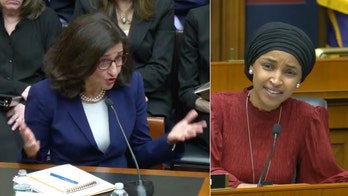Pentagon officials on Thursday defended the controversial decision to shelve plans for an Eastern Europe-based missile defense shield, dismissing charges that the United States overhauled its plans in deference to Russia.
"This is not about Russia. It never has been about Russia," said Defense Undersecretary Michele Flournoy.
In testimony before the House Armed Services Committee, administration officials insisted the decision to change plans was based on intelligence that showed Iran's short- and medium-range missile technology was developing much more quickly than previously thought while development of its long-range technology -- which the Eastern Europe shield was meant to combat -- has slowed.
The new missile defense plan calls for a system of land-, air- and sea-based interceptors, parts of which would be housed in other parts of Europe. It is aimed at defending against the kind of short- and medium-range missiles Iran is developing and testing.
But the sudden change was seen by some as an affront to Poland and the Czech Republic, where components of the old system were set to be based. And it drew charges, particularly from Republicans, that the Obama administration was caving to Russia -- since Russia opposed a shield in Eastern Europe.
Rep. Howard "Buck" McKeon, R-Calif., ranking Republican on the committee, said Thursday that he remains "skeptical" toward the change.
"I think there are questionable assumptions, a lot of ifs and considerable geopolitical consequences," he said.
McKeon pointed to the disclosure of Iran's nuclear facility at Qom last week as a sign of how intelligence can change, and questioned the "sudden" and "inconsistent" intelligence on Iran's missile technology that apparently led to the change in the administration's missile defense plans.
Plus he noted that he's seen no indication that the change will drive Russia to help the U.S. put more pressure on Iran to curb its nuclear program.
But officials said Russia was not a factor in the decision making.
"Nothing that we did had anything to do with Russian saber rattling, or their consternation about ground-based interceptors or the Czech radar. The decision was not part of any trade-off or quid pro quo," said Ellen Tauscher, undersecretary of state for arms control and international security. "If as a consequence of President Obama's decision relations with Russia improve, then we should embrace that benefit."
Flournoy said the change in intelligence on Iran missile technology was the driving factor and that the new system will be "far more effective." She said intelligence showed that Iran's short- and medium-range missile technology, and the threat it poses to allies in the Middle East and Europe, has to "be dealt with sooner."
"We are not scrapping missile defense in Europe. We are strengthening it," she said.
"The objectives have not changed," said Gen. James Cartwright, vice chairman of the Joint Chiefs of Staff.




